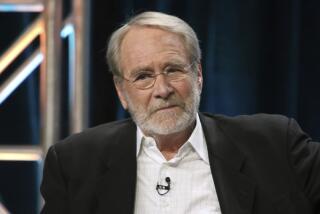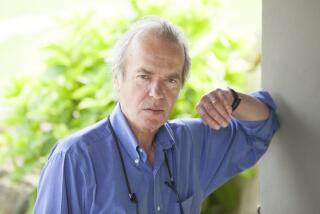Kary Mullis, quirky Nobel laureate whose DNA discovery changed the science world, dies
Kary B. Mullis was an LSD-dropping, climate-change-denying, astrology-believing, board surfing, Nobel Prize-winning chemist who was both widely respected and equally criticized for his controversial views.
Deemed an āuntamed geniusā by fellow researchers, Mullis shared a 1993 Nobel for developing a technique called polymerase chain reaction, or PCR, that allowed scientists to create millions of copies of a single DNA molecule.
It was hailed as one of the most important scientific inventions of the 20th century; a discovery that ā among countless other applications and research ā gave scientists the ability to study DNA from a 40,000-year-old frozen mammoth and helped investigators take tiny amounts of DNA to identify or exonerate crime suspects. Itās the technique that Hollywood used to revive dinosaurs from fossilized DNA in the 1993 movie āJurassic Park.ā
Mullis died Aug. 7 in his Newport Beach, Calif., home from heart and respiratory failure, said his wife Nancy Cosgrove Mullis. He was 74.
An offbeat, chatty, restless and unconventional chemist, Mullis defied the stereotype of the Nobel Prize winner. He was drunk the morning he won the prestigious prize, he once admitted, and in response to the news, went surfing near his La Jolla apartment.
Acclaimed as his technique was, Mullis was highly criticized for other theories, notably his suggestion that HIV did not cause AIDS, which he once wrote was āone hell of a mistake.ā It was a notion that cost him some credibility among his scientific peers, as did his conviction that global warming was a hoax and that ozone damage was an illusion.
āHeās a freewheeling thinker,ā Kirston Koths, a former colleague, told the San Jose Mercury News in 1999. āSome of the most interesting conversations Iāve ever had in my life have been with Kary over a gin and tonic. He has an ability to make unusual connections.ā
Mullis was born Dec. 28, 1944 in Lenoir, N.C., to Cecil Banks Mullis, a furniture salesman, and Bernice Alberta Fredericks, a Realtor. The family moved to Columbia, S.C., when Mullis was a child.
He showed a keen interest in science and exploration at a young age. Once, in high school, he designed a rocket propelled by sugar and potassium that launched a frog 7,000 feet into the blue. The amphibian, attached to a parachute, returned to Earth unscathed.
āIn another, we inadvertently frightened an airline pilot, who was preparing to land a DC-3 at Columbia airport. Our mistake,ā he said in his Nobel speech.
As an undergraduate chemistry student at Georgia Tech, Mullis put his quirky, creative mind to work; he invented an electronic device that could control a light switch with brain waves and created a laboratory for producing explosives and poisons. After graduating in 1966, he attended UC Berkeley for his PhD in biochemistry.
It was there that Mullisā interest in hallucinogens blossomed. One LSD trip once inspired a paper on time travel. It was later published by the science journal Nature.
And it was the same psychedelic drug that may have kept Mullis from testifying on DNA evidence in defense of O.J. Simpson in 1995. Mullisā lifestyle was a point of controversy during the case, with prosecutors attacking his ācredibility, competency, and sobriety.ā
Soon after completing his PhD in 1973, he took an unusual path: he dropped out of the science world to pursue fiction writing and later, for about two years, worked at a bakery.
He launched back into the science world doing research projects in universities before joining Cetus Corp., a now-defunct biotechnology firm in San Francisco, where he was working when he devised PCR in 1983.
He left Cetus in 1986 to work at the biotechnology company Xytronyx in San Diego and worked as a freelance consultant thereafter.
For his PCR discovery, Mullis was also awarded the $385,000 Japan Prize from the Science and Technology Foundation. Together with his Nobel Prize money, Mullis found financial stability and intellectual freedom. āIām done. Iām fixed. Iām a free agent and it is the most wonderful thing,ā he told Spin magazine in 1995. āI can say exactly what I feel about any issue, and Iām going to do that.ā
āKary was not narrow in his field,ā his wife said. āHe was constantly looking at everything and putting it all together.... He was self-reliant and just wanted to figure out how to do everything himself.ā
His 1998 autobiography āDancing Naked in the Mind Fieldā detailed his eccentric ideas and life adventures, further magnifying his reputation as a remarkably strange and creative thinker who defended astrology and described an alien encounter.
Reflecting on his success years later, Mullis told Parade magazine: āI think really good science doesnāt come from hard work. The striking advances come from people on the fringes, being playful.ā
Mullis divorced three times before marrying Nancy, his wife of 22 years. He is survived by children Christopher, Jeremy and Louise; two grandchildren; and two brothers.
More to Read
Start your day right
Sign up for Essential California for the L.A. Times biggest news, features and recommendations in your inbox six days a week.
You may occasionally receive promotional content from the Los Angeles Times.







